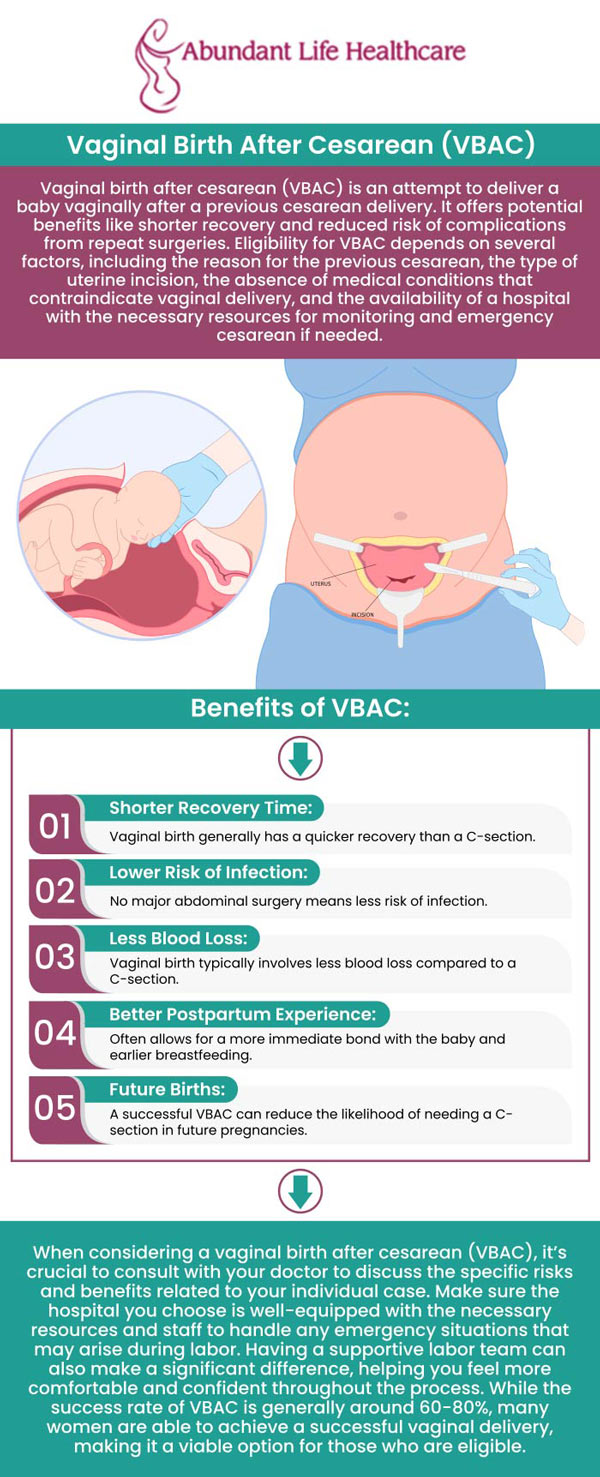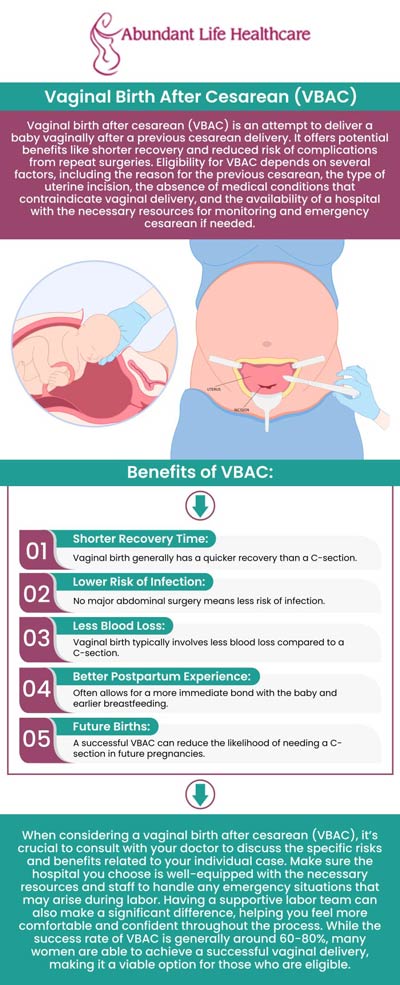Vaginal Birth after C-Section (VBAC) Specialist in Lawrenceville, GA
Vaginal birth after C-section (VBAC) is a childbirth option for women who have previously had a cesarean delivery. It involves attempting a vaginal birth instead of opting for a second C-section. Factors such as the reason for the previous C-section, the mother’s health, and the baby’s position in the uterus can influence the likelihood of a successful VBAC. Consult Dr. Marc Jean Gilles, DO, FACOG, at Abundant Life Healthcare to know if VBAC is the right option for you. For more information, contact us or schedule an appointment online. We are conveniently located at 601A Professional Drive, Suite 370, Lawrenceville, GA 30046.




Table of Contents:
What are the odds of having a VBAC after a C-section?
How long after cesarean can I get pregnant with Vaginal Birth after C-Section (VBAC)?
Who qualifies for Vaginal Birth after C-Section (VBAC)?
What disqualifies you from Vaginal Birth after C-Section (VBAC)?
For women who have previously undergone a cesarean section (C-section) at our practice, the possibility of a vaginal birth after a cesarean, or VBAC, might be a topic of interest. Dr. Jean Gilles, one of our esteemed physicians, can provide expert guidance and support for those considering this option. Understanding the likelihood of a successful VBAC is crucial, and he is committed to providing the necessary information to make an informed decision.
He informs patients that statistically, around 60% to 80% of women who attempt a VBAC have a successful vaginal delivery. However, individual success rates can be higher or lower depending on personal health factors. The probability of a successful VBAC varies depending on several factors, including:
• Type of uterine incision
• Indication for previous cesarean
• Number of prior C-sections
• Length of time since the previous cesarean
• Age of the mother
• Maternal weight and smoking
• Presence of pregnancy complications
Our team believes that while VBAC can be a desirable option, it’s important to consider potential risks, including:
• Uterine rupture
• Excessive bleeding
• Need for emergency cesarean section
The decision to attempt a VBAC should be made in consultation with Dr. Jean Gilles, considering both your personal preferences and your health situation. With the right preparation and circumstances, a VBAC can be a safe and feasible option for many women who have previously had a C-section.
Following a cesarean section (C-section), a waiting period of at least 18 months to 2 years before attempting a VBAC. This time allows your body to fully recover from the surgery and for the scar on your uterus to heal. An insufficient healing period could increase the risk of complications such as uterine rupture during VBAC.
Despite the suggested waiting period, it is important to note that a successful VBAC is not guaranteed and depends on various factors. These include the type of incision made during the C-section, your age, body mass index, and general health. A low transverse incision, for instance, heals more quickly than a classical incision, while multiple C-sections or other uterine surgeries may necessitate a longer waiting period.
In addition, the location of the placenta is another crucial factor to consider. Conditions like placenta previa or placenta accreta may pose higher risks during VBAC, potentially necessitating a C-section. Other maternal health conditions, such as obesity or pre-eclampsia, may also increase the risk of VBAC complications.
We emphasize the importance of individual consultation before deciding on VBAC. We provide personalized advice based on each patient’s unique circumstances, discussing the risks and benefits thoroughly. As every woman’s body differs, healing and recovery times can vary.
We believe that the type of incision made during a previous C-section plays a significant role in determining the suitability of a VBAC. With our comprehensive knowledge and experience, we can expertly evaluate the potential risks associated with different types of incisions.
We also take into account the reason for a previous C-section to determine the likelihood of a successful VBAC. We understand that non-recurring conditions might make a woman a suitable candidate for a VBAC, while repeatable issues could make a VBAC less advisable.
In addition to these factors, we consider the number of previous C-sections a patient has undergone, their current maternal and fetal health, and the capabilities of the healthcare facility. We recognize that the mother’s desire for a VBAC and the availability of a supportive healthcare team are also critical for a successful VBAC.
The team is well-equipped to handle emergencies and has access to facilities capable of performing emergency C-sections if needed. This ensures that all patients attempting a VBAC are in the safest possible hands.
With success rates ranging from 60% to 80%, VBAC is a viable option for many women. We are dedicated to helping our patients explore this possibility, providing expert advice and care based on their unique medical history and circumstances.
We are well-versed in the complexities surrounding vaginal birth after C-section (VBAC). We understand that VBAC is a feasible and safe option for many women, but recognize that certain factors can disqualify a woman from attempting a VBAC, such as the type of incision used in the previous c-section, her health history, and the circumstances surrounding the previous c-section.
We are skilled at considering all these factors and working with you to determine your eligibility for a VBAC. We will consider the type of incision used in your previous c-section, recognizing that vertical or “classical” uterine incisions or multiple cesarean sections may increase the risk of uterine rupture.
We will also take into account your health history, including conditions such as severe pre-eclampsia, active herpes infection, or a history of uterine scarring, which may make VBAC inadvisable. We will also consider any significant medical conditions that increase the risk of surgery or labor, such as heart disease.
Your previous c-section circumstances are also considered in determining your VBAC eligibility. If the cesarean was carried out due to a chronic issue like a narrow pelvis that could reoccur, or if you’re pregnant with multiples or your baby is in a breech position, a VBAC may not be recommended.
At Abundant Life Healthcare, our priority is the safety and well-being of our patients. We are equipped to handle VBACs, but we also understand the potential risks involved. Dr. Gilles will guide you through this process, ensuring you understand all your options and potential outcomes. For more information, contact us or schedule an appointment online. We are conveniently located at 601A Professional Drive, Suite 370, Lawrenceville, GA 30046. We serve patients from Lawrenceville GA, Suwanee GA, Snellville GA, Duluth GA, Dacula GA, Lilburn GA, Loganville GA, Auburn GA, and surrounding areas..
Check Out Our 5 Star Reviews


Additional Services You May Like

Additional Services You May Like
- Obstetrics
- Pregnancy
- Gynecologist
- Birth Control
- Labiaplasty
- Microblading
- Weight Loss
- Semaglutide GLP-1
- Pap Smears
- Pelvic Pain
- Laser Hair Removal
- In House Ultrasound (Including 3D)
- Vaginal Birth After C-Section (VBAC)
- Pregnancy As High Risk
- Multiple Gestations
- Postpartum Counseling
- 24hour/365days On Call Service
- Annual Exam
- Abnormal Uterine Bleeding
- Management Of Endometriosis
- Ultrasound
- Pelvic Organ Prolapse
- Urinary Incontinence
- Perimenopause And Menopause
- Sexual Dysfunction
- Fat Freeze (Like Cool Sculpting)
- Body Contouring
- Ozempic
- Civil Surgeon
- Hormone Replacement Therapy
- Immigration Medicine
- Biote Hormone Pellets
- GLP-1
- Peptide Therapy




